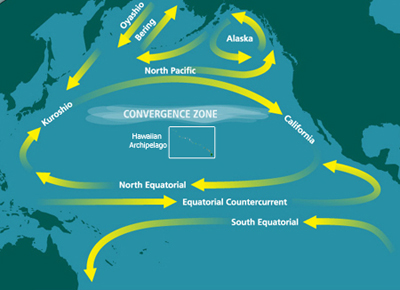Car tires found in the Pacific Trash Vortex
Swimming in crystal clear water until a plastic bag comes floating your way....
Search This Blog
Friday, March 28, 2014
Disturbing Facts
Fun facts about the Pacific Trash Vortex:
- It is roughly the size of Texas
- About 100 million tons of plastic is created each year
- Approximately 10% of that plastic ends up in the ocean
- 70% of plastic thrown in to the ocean sinks to the bottom meaning only 30% can be seen by the common observer on a boat
- Scientists have collected 750,000 small pieces of plastic in 1 kilometer of the Great Garbage Patch
- The bigger pieces of trash that are found are sometimes consumed by birds and marine animals who mistake them for prey
- Animals also become entangled in the discarded nets, ropes, and pieces of plastic
- Pieces of plastic also absorb chemicals so if ingested by animals, the animals are ingesting highly dangerous and undigestable, chemically soaked plastic
- No nation currently takes responsibility for this patch of garbage and all refuse to put money forth to clean it up
http://www.greenpeace.org/international/en/campaigns/oceans/pollution/trash-vortex/
http://education.nationalgeographic.com/education/encyclopedia/great-pacific-garbage-patch/?ar_a=1
Wednesday, March 26, 2014
The Pacific Trash Vortex: What is it?
The Pacific Trash Vortex: What is it?
However, there are some parts of the ocean where the beaches aren't clean and white and where the blue water is fragmented with empty bottles and plastic bags: I'm talking about the Pacific Trash Vortex. Also known as The Great Garbage Patch, this area of ocean which is located in the North Pacific Ocean is a home to chemicals, plastic bags, sludge, and other items that humans create and deposit. These pieces of debris get trapped here and in other parts of the ocean due to the circular current. The estimates of the size range from 700,000 kilometers to 15,000,000 kilometers. Items float there and then get stuck created a "pile up". A trash dump inside Mother Nature's womb.
Despite the way it sounds, this not-so-average trash dump is not one that you would boat over and directly identify. Because a large amount of the trash is plastic or contains plastic, it often breaks down in the water and becomes hard to see. This area is identified by measuring the neustonic plastic in the water in certain areas. Not to mention that many of the trash that rests in this area is found beneath the surface of the water and the depth of this area can be thousands of feet deep.
So.... Would you vacation here?
http://en.wikipedia.org/wiki/Great_Pacific_garbage_patch
http://www.greenpeace.org/international/Global/international/planet-2/report/2007/8/plastic_ocean_report.pdf
Subscribe to:
Comments (Atom)
